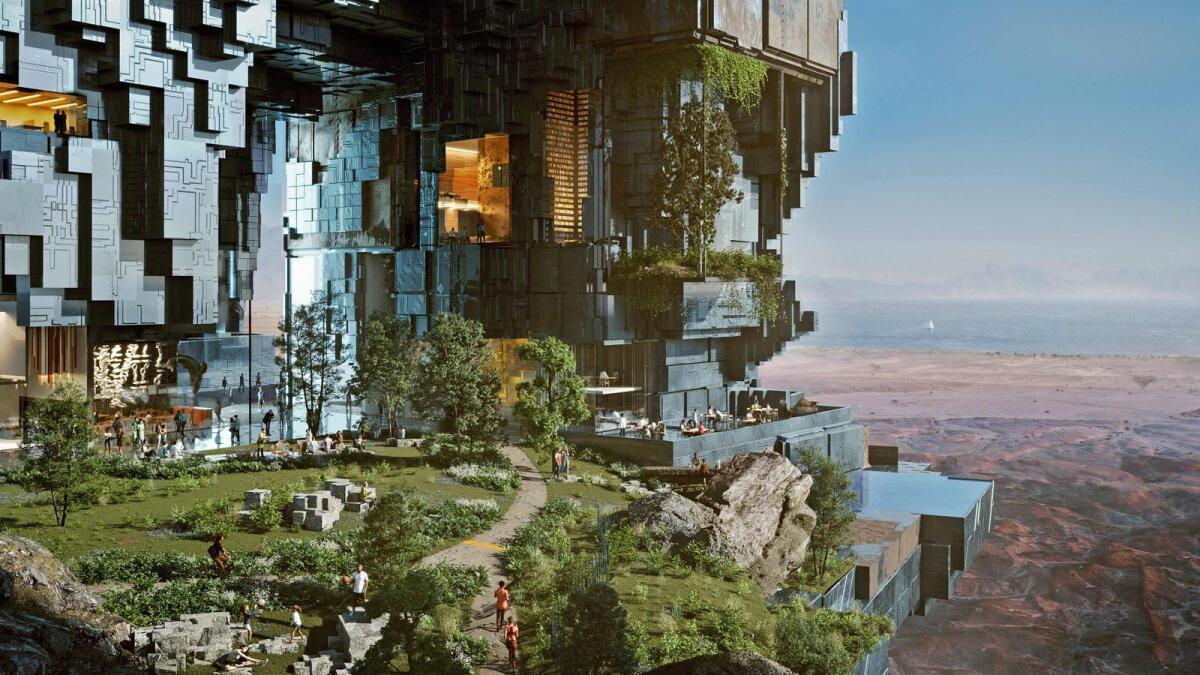
Neom Re-Writing 'The City', One Megadevelopment At A Time
As I people-watch, I notice an absence. There is something odd, something different. I hear no traffic sounds, no spluttering diesel engines or honking horns, just the gentle hum of electric motors and the tread of scooter wheels grazing on freshly laid roads. This is NC1, my first encounter with the good folks of Neom.
We are visiting Neom to deliver a digital wellbeing workshop. Over the coming days, we will explore how technology can promote human flourishing and how best to prevent some of tech's unintended negative impacts on physical, psychological and social health. This is an ever-more critical focus as our daily lives become increasingly digitised and intertwined with the fruits of our own technological innovation.
Neom aspires to next-level connectivity. Located in the northwest of Saudi Arabia, this region is now home to some of the world's most futuristic and technologically advanced megadevelopments, projects such as The Line, Magna, Trojena, Sindalah, and Oxagon - places with names too new for my spellchecker to recognise.
The word Neom itself is novel, a combination of the Greek prefix neo, meaning new, and the Arabic letter meem (m), used here to signify the word mustaqbal (future). New Future, or Neom, remains a work in progress, but it speaks of necessary change, innovative living, and novel ways to work, rest and play.
Ideas about future lifestyles and habitations have traditionally been the terrain of writers, poets and philosophers. For instance, in 1516, Sir Thomas More wrote a work of fiction titled Utopia. In it, More describes an imaginary land where gold and silver have no value. The working day is limited to six hours, leaving lots of study time. For the Utopians, happiness is rooted in improving their minds.
However, for every utopia ever written, there are an equal number of dystopias. These more pessimistic ideas about the future often centre on technology. In E.M. Forster's 1909 novella The Machine Stops, humans of the future live in underground bunkers isolated from each other, totally dependent on“the machine” for communication, entertainment, shelter, and sustenance. Due to physical inactivity and a sunless subterranean existence, humans become physically weak - swaddled lumps of flesh with faces as white as fungus.
Similarly, in Neal Stephenson's 1992 novel Snow Crash, we are introduced to a future world called the“Metaverse”. This virtual world is viewed as a successor to the Internet, populated by millions of people and chatbots in avatar form. Visually stunning and engagingly interactive, this online world is used as an escape from the pain and horror of the physical one.
At Neom, the future is being written in concrete and aluminium, glass and steel. - AFP fileNeom, however, is not a work of fiction. Here, the future is being written in concrete and aluminium, glass and steel. These forward-looking megadevelopments are also integrating groundbreaking technologies with unrivalled computing capabilities to improve the lives of residents and visitors. Additionally, at the heart of Neom's vision is a commitment to conservation and environmental sustainability. Around 95 per cent of the land and sea will be protected for nature, along with an ambitious programme for regreening and rewilding.
Photo courtesy:: Anisa AlkunshalieAccording to the United Nations, two-thirds of all people on Earth will live in cities by 2050. Meeting this urban expansion requires new, smarter cities - human habitation that breaks old moulds. This calls for sustainable urban planning and innovations in infrastructure and public services - Neom's rewriting of 'The City' promises to provide a valuable blueprint that others might follow.
We finished our two-day workshop exploring digital wellbeing with team Neom. This diverse group included specialists in population health, architects, educators, psychologists, and more. These passionate frontierspeople were committed to getting the most from tech while remaining deeply human-centric. Our future cities will be digital ecosystems – how we do tech has never mattered more.
Dr Justin Thomas is a chartered psychologist and senior researcher in the Digital Wellbeing Program (Sync) at the King Abdulaziz Center for World Culture (Ithra).

Legal Disclaimer:
MENAFN provides the
information “as is” without warranty of any kind. We do not accept
any responsibility or liability for the accuracy, content, images,
videos, licenses, completeness, legality, or reliability of the information
contained in this article. If you have any complaints or copyright
issues related to this article, kindly contact the provider above.


















Comments
No comment